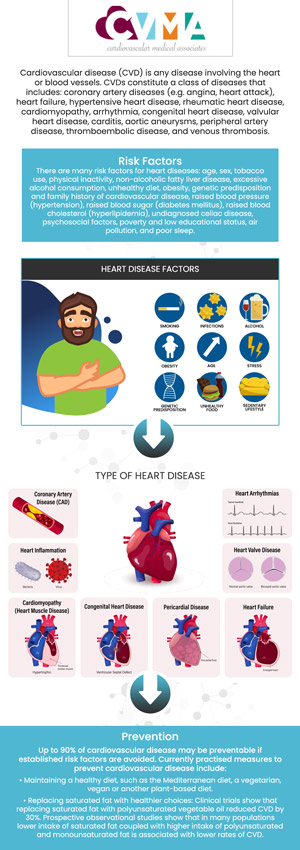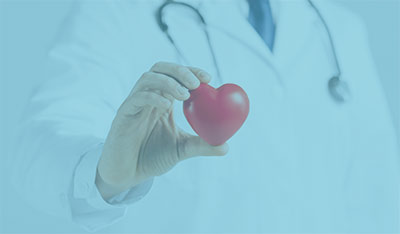Cardiovascular Disease Treatment in Downey, CA
Cardiovascular disease is a condition affecting the heart or blood vessels. It is typically linked to an excess of fat deposits in the arteries, which obstructs blood flow to the brain or heart. Two potential causes of strokes include blood clots and bleeding from brain arteries. Heart care and treatments are provided by our professionals at Cardiovascular Medical Associates. For more information, contact us or book an appointment online. We serve patients from Downey, CA, and surrounding areas.




Table of Contents:
What is cardiovascular disease caused by?
What are the 3 most common cardiovascular diseases?
What are the first signs of a weak heart?
How is cardiovascular disease diagnosed?
Our primary focus is comprehensive cardiovascular care from experienced and highly skilled cardiologists who are knowledgeable about all current techniques for the diagnosis, management and treatment of heart disease.
CVMA provides high quality, state of the art, and comprehensive cardiovascular care in a compassionate and service-oriented environment. Our cardiologist are board-certified cardiologists who specialize in the diagnosis and treatment of cardiovascular disease.
Our offices provide diagnostic services with state-of-the-art testing equipment. These specialized services include nuclear imaging, vascular flow studies, echocardiography, and stress testing.
- Coronary Artery Disease
- Cardiac Arrhythmia Management
- Hypertension
- Lipid Management
- Heart Failure Management
- Peripheral Vascular Disease
- Venous Insufficiency Management And Treatment
- Valvular Disease
- Coumadin Clinic
- Pacemaker Clinic
Cardiovascular disease encompasses a wide variety of heart-related health conditions that range in severity, symptoms, and causes. The health of your heart can quickly affect the health of your entire body, making maintaining heart-healthy habits essential in living a long, comfortable, life. The risks of developing heart conditions increase with age, making it vital for patients to be aware of potential symptoms and risk factors to look out for.
There are multiple types of cardiovascular diseases, each with unique causes. However, these causes are the result of increased risk factors, often dependent on the lifestyle habits and medical history of each individual patient. Some of the causes of common cardiovascular diseases include the build-up of plaque in the arteries, scarring of the heart muscles, side effects from medications, and genetic predispositions to specific cardiovascular diseases. Risk factors that increase the chances of developing cardiovascular diseases include:
– High blood pressure and cholesterol levels
– Type 2 diabetes
– Obesity or being overweight
– Tobacco or drug use
– Frequent consumption of alcohol
– Chronic kidney disease
– Chronic autoimmune or inflammatory conditions
– Maintaining a diet that is high in sodium, fat, and/or sugar
– Lack of physical activity
– Family history of cardiovascular disease
Three of the most common types of cardiovascular diseases include coronary artery disease, congestive heart failure, and heart attacks. Coronary artery disease develops when blood flow from the coronary arteries to the heart muscle is limited due to plaque build-up. Congestive heart failure develops when the heart is unable to sufficiently pump blood to the rest of the body, causing a build-up of fluids and blood to collect in the lungs, feet, and legs with time. This is a long-term condition that is very life-limiting for many patients. There are three different types of congestive heart failure; left-sided heart failure, right-sided heart failure, and high-output heart failure. Heart attacks are typically the most common cardiovascular disease, occurring when the flow of blood is slowed down significantly or blocked due to a gradual build-up of plaque, causing blood clots to form around the plaque. A heart attack happens when the heart muscle is no longer able to get the oxygen that is delivered through the blood flow it requires to function due to this blockage.
Some early indicators that you may be having problems with the health of your heart include:
– Chest pain
– Stomach pain or indigestion
– Fatigue, weakness
– Increased frequency of urination at night
– Reduced or loss of appetite
– Fast or irregular heartbeats
– Swelling of the feet, ankles, and legs
– Reduced physical capabilities, particularly while exercising
– Increased difficulty concentrating
– Shortness of breath when lying down or exercising
Each of these symptoms on their own may be just indicative of a heart problem, but almost any of them being experienced at the same time as chest pain, along with excessive sweating or clamminess and nausea should be addressed by healthcare providers immediately as they may be indicative of a medical emergency such as heart failure. If you are ever unsure if your symptoms warrant emergency medical services, contact your healthcare provider or a nearby urgent care clinic to determine the recommended course of action to receive appropriate and timely treatment.
Depending on your experience symptoms, your healthcare provider may wish to confirm a diagnosis of cardiovascular disease using diagnostic tools such as an ECG (electrocardiogram) to measure the electrical activity of your heart or a coronary angiogram. A coronary angiogram is a special type of x-ray that examines the coronary arteries that are responsible for supplying the heart muscle with blood to assess for blocked or narrowed blood vessels within the heart. This type of test is completed to diagnose coronary artery disease. CT scans, ultrasounds, cardiac MRIs, cardiac catheterization, stress tests, echocardiograms, and blood work may be used depending on the described and displayed symptoms to narrow down the cause of the symptoms to determine the type of cardiovascular disease. An accurate diagnosis is essential in providing the best course of treatment and determining the severity of the condition.
For more information, contact us and book an appointment. We serve patients from Downey CA, Norwalk CA, Lynwood CA, Cerritos CA, Lakewood CA, Whittier CA, and surrounding areas.






